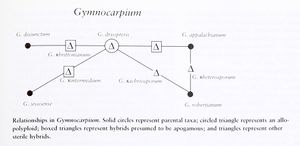Difference between revisions of "Gymnocarpium"
Phytologist 4: 371. 1851.
FNA>Volume Importer |
FNA>Volume Importer |
||
| Line 24: | Line 24: | ||
|discussion=<p>Species 8 (5 in the flora).</p> | |discussion=<p>Species 8 (5 in the flora).</p> | ||
|tables= | |tables= | ||
| − | |references= | + | |references={{Treatment/Reference |
| + | |id=pryer1983a | ||
| + | |text=Pryer, K. M. and D. M. Britton. 1983. Spore studies in the genus Gymnocarpium. Canad. J. Bot. 61: 377--388. | ||
| + | }}{{Treatment/Reference | ||
| + | |id=pryer1983b | ||
| + | |text=Pryer, K. M., D. M. Britton, and J. McNeill. 1983. A numerical analysis of chromatographic profiles in North American taxa of the fern genus Gymnocarpium. Canad. J. Bot. 61: 2592--2602. | ||
| + | }}{{Treatment/Reference | ||
| + | |id=pryer1992a | ||
| + | |text=Pryer, K. M. 1992. The status of Gymnocarpium heterosporum and G. robertianum in Pennsylvania. Amer. Fern J. 82: 34--39. | ||
| + | }}{{Treatment/Reference | ||
| + | |id=pryer1993a | ||
| + | |text=Pryer, K. M. and C. H. Haufler. 1993. Isozymic and chromosomal evidence for the allotetraploid origin of Gymnocarpium dryopteris (Dryopteridaceae). Syst. Bot. 18: 150--172. | ||
| + | }}{{Treatment/Reference | ||
| + | |id=sarvela1978a | ||
| + | |text=Sarvela, J. 1978. A synopsis of the fern genus Gymnocarpium. Ann. Bot. Fenn. 15: 101--106. | ||
| + | }}{{Treatment/Reference | ||
| + | |id=sarvela1981a | ||
| + | |text=Sarvela, J., D. M. Britton, and K. M. Pryer. 1981. Studies on the Gymnocarpium robertianum complex in North America. Rhodora 83: 421--431. | ||
| + | }}{{Treatment/Reference | ||
| + | |id=wagner1966a | ||
| + | |text=Wagner, W. H. Jr. 1966b. New data on North American oak ferns, Gymnocarpium. Rhodora 68: 121--138. | ||
| + | }} | ||
}}<!-- | }}<!-- | ||
| Line 85: | Line 106: | ||
|family=Dryopteridaceae | |family=Dryopteridaceae | ||
|distribution=North temperate regions;North America;Eurasia. | |distribution=North temperate regions;North America;Eurasia. | ||
| − | |reference= | + | |reference=pryer1983a;pryer1983b;pryer1992a;pryer1993a;sarvela1978a;sarvela1981a;wagner1966a |
|publication title=Phytologist | |publication title=Phytologist | ||
|publication year=1851 | |publication year=1851 | ||
|special status= | |special status= | ||
| − | |source xml=https://jpend@bitbucket.org/aafc-mbb/fna-data-curation.git/src/ | + | |source xml=https://jpend@bitbucket.org/aafc-mbb/fna-data-curation.git/src/f50eec43f223ca0e34566be0b046453a0960e173/coarse_grained_fna_xml/V2/V2_75.xml |
|genus=Gymnocarpium | |genus=Gymnocarpium | ||
}}<!-- | }}<!-- | ||
-->[[Category:Treatment]][[Category:Dryopteridaceae]] | -->[[Category:Treatment]][[Category:Dryopteridaceae]] | ||
Revision as of 20:52, 16 December 2019
Plants terrestrial. Stems long-creeping, stolons absent. Leaves monomorphic, dying back in winter. Petiole ca. 1.5–3 times length of blade, base not swollen; vascular bundles 2, lateral, ± oblong in cross section. Blade broadly deltate, ternate, or ovate, 2–3-pinnate-pinnatifid, reduced distally to pinnatifid apex, herbaceous. Pinnae weakly articulate to rachis but persistent, segment margins entire to crenate; proximal pinnae longest, petiolulate, usually ± inequilateral with pinnules on basiscopic side longer than those on acroscopic side; costae adaxially grooved, grooves not continuous from rachis to costae; indument lacking or of minute (0.1 mm) glands abaxially and sometimes along costae adaxially. Veins free, simple or forked. Sori in 1 row between midrib and margin, ± round; indusia absent. Spores brownish, rugose. x = 40.
Distribution
North temperate regions, North America, Eurasia.
Discussion
Species 8 (5 in the flora).
Selected References
Lower Taxa
Key
| 1 | Adaxial blade surface glabrous or moderately glandular, abaxial blade surface and rachis moderately or densely glandular. | > 2 |
| 1 | Adaxial and abaxial blade surfaces and rachis essentially glabrous. | > 3 |
| 2 | Blades glabrous on adaxial surface; proximal pinnae and basiscopic pinnules of proximal pinnae curving toward apex of leaf and apex of pinna, respectively; pinnae of 2d pair almost always sessile with basal pinnules ± equal in length to adjacent pinnules. | Gymnocarpium jessoense subsp. parvulum |
| 2 | Blades moderately glandular on adaxial surface; proximal pinnae and basiscopic pinnules of proximal pinnae ± perpendicular to rachis and costa, respectively; pinnae of 2d pair usually stalked, or if sessile with basal pinnules shorter than adjacent pinnules. | Gymnocarpium robertianum |
| 3 | Pinnae of 2d pair and basal basiscopic pinnule of proximal pinnae stalked. | Gymnocarpium appalachianum |
| 3 | Pinnae of 2d pair sessile or rarely stalked; proximal basiscopic pinnule of basal pinnae sessile. | > 4 |
| 4 | Pinnae of 2d pair sessile with basal pinnules unequal in length (basiscopic markedly longer); ultimate segments of proximal pinnae slightly lobed to crenate, apex often crenulate, acute; blades 8-24 cm. | Gymnocarpium disjunctum |
| 4 | Pinnae of 2d pair rarely stalked, if sessile with basal pinnules ± equal in length (basiscopic = acroscopic); ultimate segments of proximal pinnae crenate to entire, apex entire, rounded; blades 3-14 cm. | > 5 |
| 5 | Sessile basal basiscopic pinnule of proximal pinnae with basal basiscopic pinnulet (division of pinnule) ± equal in length to adjacent pinnulet; pinnae of 2d pair usually sessile, with basal pinnules ± equal in length to adjacent basal pinnule; spores 34-39 µm. | Gymnocarpium dryopteris |
| 5 | Sessile basal basiscopic pinnule of proximal pinnae with basal basiscopic pinnulet shorter than adjacent pinnulet; pinnae of 2d pair sessile, with basal pinnules shorter than adjacent pinnule, or 2d basal pinnae rarely stalked; spores 27-31 µm. | Gymnocarpium appalachianum |
